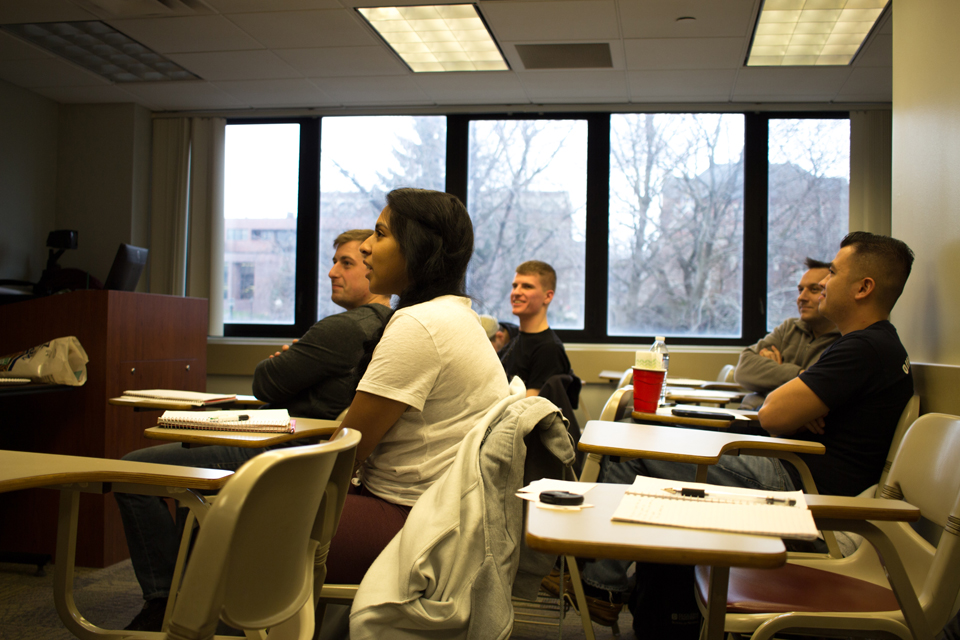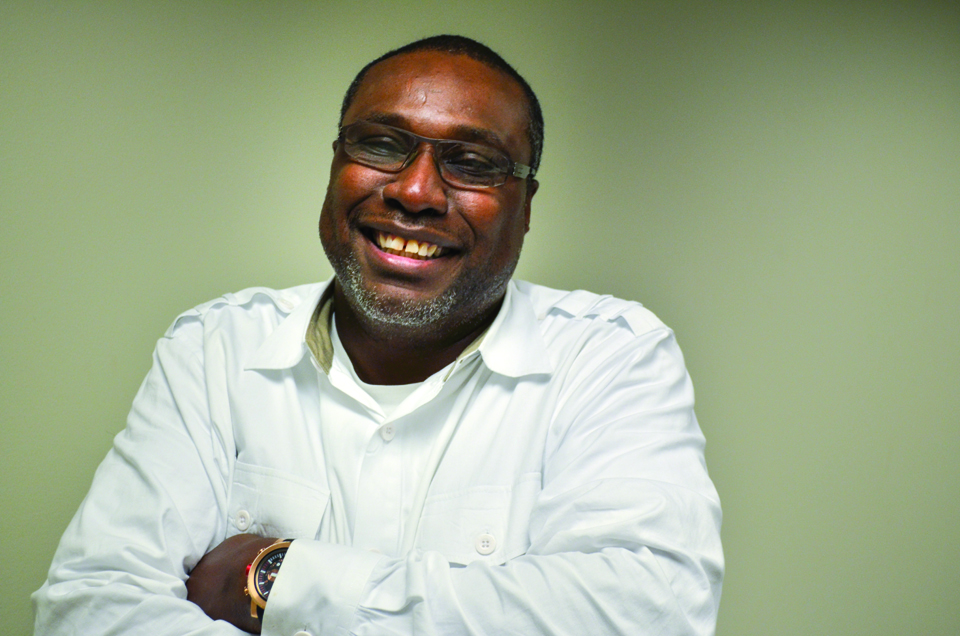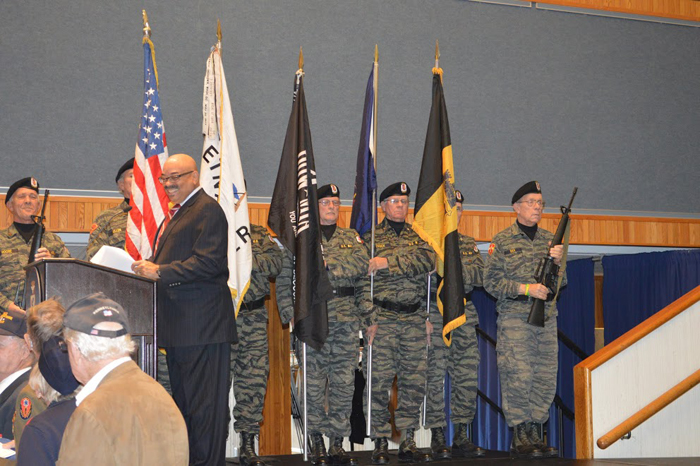
By: Seth Culp-Ressler | Assistant Features Editor
While Veterans Day may be in the headlines this week, for those associated with Duquesne Law School’s Veterans Clinic, our servicemen and women are always on the mind.

John Rago, Duquesne professor of law and faculty overseer for the Veterans Clinic, explained that the program works in conjunction with the Allegheny County Veterans Court. The Clinic is a pioneering initiative that allows students to not only gain practical legal experience, but also to make a difference in the lives of those who need it the most. Veterans Court itself is what’s called a special court. Allegheny County has five such courts, and they all focus on problem-solving.
“What we try to do is identify those veterans as early as possible who get involved in a criminal justice system,” Rago said, “And we try to help them. We try to help them restore their position in society, their position in life.”
Daniel Kunz, supervising attorney for the Veterans Clinic, said that almost all of the individuals involved with Veterans Court have come back from their service with conditions such as depression, traumatic brain injuries or post traumatic stress disorder (PTSD). For these veterans, the illnesses they faced have led them to drugs, alcohol and eventually the inevitable run-ins with the law.
“Most people get in trouble with the law or get [the justice system] involved because of a problem,” he said. “Most people aren’t just bad people, because usually an issue causes them to act bad.”
Judge John Zottola, who presides over the Allegheny County Veterans Court, said that the process is achieved by a three phase program. After a personalized treatment plan is created, the individual involved moves through the Honor, Courage and Commitment phases, with regular checkups in court. Throughout each phase the individual’s sobriety, performance and conduct are examined.
Zottola explained that what the students involved with the Veterans Clinic ultimately do is represent the individuals as they move through the phases of the program. The students are certified by the Pennsylvania Supreme Court, meaning that they are acting just as any other lawyer would within the courtroom.
“When [the veterans] are adjudicated the first time, typically private council will cede their next representation as far as reviews to the Duquesne law students,” Zottola said. “So they’ll go through the Honor phase with them, the Courage phase, which is approximately a six-month part of the program and then ultimately the Commitment phase which is the phase they’ll remain in until their graduation.”
Debra Barnisin-Lange, Allegheny County Assistant District Attorney, helped create and teach the program in its first two years. She said that this hands-on experience is exactly what the program aimed to provide for students. The benefit was twofold, students got both practical experience and an insight into the humanitarian side of law.
“The idea was hatched to give the opportunity to the students to get the experience to work with the veterans and experience in criminal court representing people, and hopefully plant the seed of the idea that, throughout these legal careers that people who graduate from Duquesne will have, that they will pay this forward and remember that there are certain segments of the population that need extra help,” Barnisin-Lange said.
Kunz said that this year he has tried to focus on giving the students more experience with being a criminal defense attorney. To do that, the students would represent a veteran if a problem would arise while the individual moves through the Veterans Court program.
“Their role is to act as a defense council,” Kunz said. “So if there is an issue to arise while the individual is in the court, then we represent them. Some of the things would be if the veteran has a relapse or if the veteran gets in trouble while they’re in Veterans Court. We advocate for them.”
Kunz said that Duquesne’s representation of veterans is really a unique program, and one that sets the university apart from other law schools.
“We’re kind of filling a niche right now,” Kunz said, “Because there’s not a lot of law schools that do this, not a lot of law schools that will take on the criminal defense of veterans. So we’re the very first in the country doing that.”
The Clinic’s success is getting not only recognition, but also support from the local Allegheny County court system. As Judge Zottola pointed out, Duquesne has about 10 copies of a textbook called Defending Veterans in Criminal Court, which are used in the clinic. At a couple hundred dollars a copy, they aren’t cheap. That said, District Attorney Steve Zappala acquired funds to provide them for the school free of charge. Even then, as Zottola said, Duquesne’s Veterans Clinic is ultimately saving money.
“For the taxpayers of Allegheny County it is beneficial in that rather than having to have to expend the funds necessary for a public defender, perhaps a public defender paralegal which could cost anywhere altogether up to $100,000 or more,” he said. “Those taxpayers don’t have those expenses because the law students are doing it and it’s no cost to the courts.”
So, the students are saving the county money, but that’s not to say they are providing lower-quality work. In fact, the truth is quite the opposite. Barnisin-Lange said that the recidivism rate in the normal court system is about 60-66 percent. That drops to about 15 percent for the other special problem-solving courts the county has. Veterans Court, however, has far outperformed even that statistic.
“In Veterans Court, and this is true across the country, we’ve found that with all of this support and with all of this structure and with the camaraderie of having the fellow veterans together is that they’re hitting it out of the park. Our recidivism rate is less than 1 percent with the people who’ve been through,” Barnisin-Lange explained.
Rago said that it’s clear that the Clinic is working, and all one has to do to figure that out is talk to one of the veterans involved.
“It would break your heart if you heard their stories and on the back end when they come through the program finally to hear how they thank us, ‘You saved my life,’” Rago said. “When somebody says that to you, I mean it’s just one of the most profound things anybody can say to somebody. ‘You saved my life.’ And I see it, you see it every day with these people.”
As he said, not everybody should just be taken off the streets. What really needs to happen is people need help, and that’s what specialty courts do.
“Nowhere have we seen the need responded to more clearly than with veterans,” Rago said. “It’s timely that it’s Veterans Day and that we’re talking about this, but this is a timeless problem.”
For Kunz, it’s really just a matter of obligation. Veterans have given so much for our country, and they’ve come back worse because of it. For that reason he wants to do anything he can to help them get their lives back on track.
“These men and women, they became injured by going over to defend us,” Kunz said. “So I want to do everything I can to defend them now that they’re home.”




